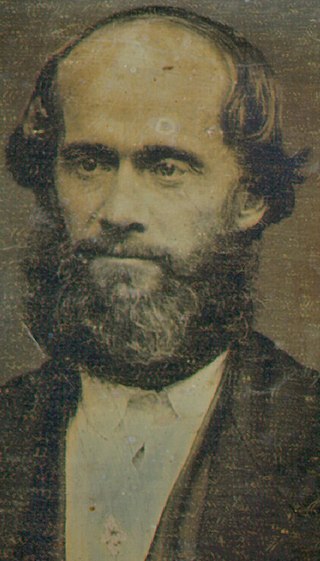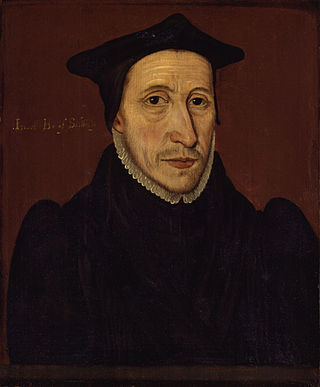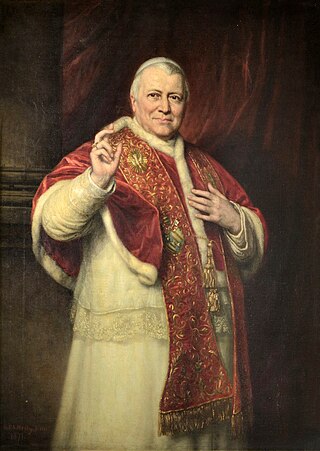Related Research Articles

In European Christianity, the divine right of kings, divine right, or God's mandation, is a political and religious doctrine of political legitimacy of a monarchy. It is also known as the divine-right theory of kingship.

The Epistle to the Romans is the sixth book in the New Testament, and the longest of the thirteen Pauline epistles. Biblical scholars agree that it was composed by Paul the Apostle to explain that salvation is offered through the gospel of Jesus Christ.

Irenaeus was a Greek bishop noted for his role in guiding and expanding Christian communities in the southern regions of present-day France and, more widely, for the development of Christian theology by combating heterodox or Gnostic interpretations of Scripture as heresy and defining proto-orthodoxy. Originating from Smyrna, he had seen and heard the preaching of Polycarp, who in turn was said to have heard John the Evangelist, and thus was the last-known living connection with the Apostles.
William Tyndale was an English biblical scholar and linguist who became a leading figure in the Protestant Reformation in the years leading up to his execution. He is well known as a translator of the Bible into English, and was influenced by the works of prominent Protestant Reformers such as Martin Luther.
Sola scriptura is a Christian theological doctrine held by most Protestant Christian denominations, in particular the Lutheran and Reformed traditions, that posits the Bible as the sole infallible source of authority for Christian faith and practice. The Catholic Church considers it heterodox and generally the Orthodox churches consider it to be contrary to the phronema of the Church.
The Thirty-nine Articles of Religion, finalised in 1571, are the historically defining statements of doctrines and practices of the Church of England with respect to the controversies of the English Reformation. The Thirty-nine Articles form part of the Book of Common Prayer used by the Church of England, the US Episcopal Church, and the Anglican Church in North America among other denominations in the worldwide Anglican Communion and Anglican Continuum.

The Westminster Confession of Faith, or simply the Westminster Confession, is a Reformed confession of faith. Drawn up by the 1646 Westminster Assembly as part of the Westminster Standards to be a confession of the Church of England, it became and remains the "subordinate standard" of doctrine in the Church of Scotland and has been influential within Presbyterian churches worldwide.

The Church of Jesus Christ of Latter Day Saints—usually distinguished with a parenthetical (Strangite)—is one of the several organizations that claim to be the legitimate continuation of the church founded by Joseph Smith on April 6, 1830. It is a separate organization from the considerably larger and better known Utah-based Church of Jesus Christ of Latter-day Saints (LDS Church). Both churches claim to be the original organization established by Smith. The Strangite church is headquartered in Voree, Wisconsin, just outside Burlington, and accepts the claims of James Strang as successor to Smith. It had approximately 300 members in 1998. An undated FAQ on the church's official website reports there are around 130 active members throughout the United States.

Rowland Taylor was an English Protestant martyr during the Marian Persecutions.

John Jewel of Devon, England was Bishop of Salisbury from 1559 to 1571.

The vestments controversy or vestarian controversy arose in the English Reformation, ostensibly concerning vestments or clerical dress. Initiated by John Hooper's rejection of clerical vestments in the Church of England under Edward VI as described by the 1549 Book of Common Prayer and 1550 ordinal, it was later revived under Elizabeth I. It revealed concerns within the Church of England over ecclesiastical identity, doctrine and church practices.

The primacy of Peter, also known as Petrine primacy, is the position of preeminence that is attributed to Peter among the Twelve Apostles.
His (Royal) Apostolic Majesty was a styled title used by the Kings of Hungary, in the sense of being latter-day apostles of Christianity.

In Christianity, the Confession of Peter refers to an episode in the New Testament in which the Apostle Peter proclaims Jesus to be the Christ. The proclamation is described in the three Synoptic Gospels: Matthew 16:13–20, Mark 8:27–30 and Luke 9:18–21. Depending on which gospel one reads, Peter either says: 'You are the Messiah' or 'the Christ' ; or 'You are the Messiah, the Son of the living God',, or 'God's Messiah' or 'The Christ of God'.

The Tyndale Bible (TYN) generally refers to the body of biblical translations by William Tyndale into Early Modern English, made c. 1522–1535. Tyndale's Bible is credited with being the first Bible translation in the English language to work directly from Hebrew and Greek texts, although it relied heavily upon the Latin Vulgate and Luther's German New Testament. Furthermore, it was the first English biblical translation that was mass-produced as a result of new advances in the art of printing.

The roles of women in Christianity have varied since its founding. Women have played important roles in Christianity especially in marriage and in formal ministry positions within certain Christian denominations, and parachurch organizations. In 2016, it was estimated that 52–53 percent of the world's Christian population aged 20 years and over was female, with this figure falling to 51.6 percent in 2020. The Pew Research Center studied the effects of gender on religiosity throughout the world, finding that Christian women in 53 countries are generally more religious than Christian men, while Christians of both genders in African countries are equally likely to regularly attend services.

In Christian eschatology, the Antichrist refers to people prophesied by the Bible to oppose Jesus Christ and substitute themselves in Christ's place before the Second Coming. The term Antichrist is found four times in the New Testament, solely in the First and Second Epistle of John. The Antichrist is announced as the one "who denies the Father and the Son."
The doctrine of the clarity of Scripture is a Protestant Christian position teaching that "...those things which are necessary to be known, believed, and observed, for salvation, are so clearly propounded and opened in some place of Scripture or other, that not only the learned, but the unlearned, in a due use of the ordinary means, may attain unto a sufficient understanding of them". Clarity of scripture is an important doctrinal and Biblical interpretive principle for historical Protestants and, today, for many evangelical Christians; it is adhered to by the Lutheran, Reformed, Anglican and Methodist churches. Perspicuity of scripture does not imply that people will receive it for what it is, as many adherents to the doctrine of perspicuity of scripture accept the Calvinist teaching that man is depraved and needs the illumination of the Holy Spirit in order to see the meaning for what it is. Martin Luther advocated the clearness of scripture in his work On the Bondage of the Will. Arminius argued for the perspicuity of scripture by name in "The Perspicuity of the Scriptures".

Papal infallibility is a dogma of the Catholic Church which states that, in virtue of the promise of Jesus to Peter, the Pope when he speaks ex cathedra is preserved from the possibility of error on doctrine "initially given to the apostolic Church and handed down in Scripture and tradition". It does not mean that the pope cannot sin or otherwise err in some capacity, though he is prevented by the assistance of the Holy Spirit from issuing heretical teaching even in his non-infallible Magisterium, as a corollary of indefectibility. This doctrine, defined dogmatically at the First Vatican Council of 1869–1870 in the document Pastor aeternus, is claimed to have existed in medieval theology and to have been the majority opinion at the time of the Counter-Reformation.

"I am the LORD thy God" is the opening phrase of the Ten Commandments, which are widely understood as moral imperatives by ancient legal historians and Jewish and Christian biblical scholars.